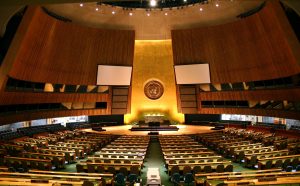As the unrest in Myanmar has intensified in the month since the military’s seizure of power, the crisis is also playing out in the quiet, carpeted halls of the United Nations building in New York, where a dispute is simmering over who has the right to represent Myanmar within the global body.
The dispute sharpened on Friday when Myanmar’s U.N. Ambassador Kyaw Moe Tun gave an emotional address to the General Assembly, in which he publicly broke with the junta, raised a three-finger salute in solidarity with anti-coup protesters, and pledged loyalty to the Committee Representing Pyidaungsu Hluttaw, a shadow parliament formed by lawmakers chosen at November’s election.
He also called for “strongest possible action from the international community to immediately end the military coup, to stop oppressing the innocent people, to return the state power to the people, and to restore the democracy.”
The following day, the junta dismissed Kyaw Moe Tun for “betraying the country” and replaced him with his deputy Tin Maung Naing. But Kyaw Moe Tun has refused to vacate his post, arguing that he represents Myanmar’s legitimate government – something with which a majority of U.N. member states, if asked to vote on it, might well agree.
Ambassadors of many countries have expressed support for Kyaw Moe Tun’s gesture. U.S. Ambassador Linda Thomas-Greenfield told reporters that she had been “extraordinarily moved” by the Myanmar ambassador’s speech to the Assembly. On Tuesday, U.S. State Department spokesperson Ned Price said that Washington’s understanding was that Kyaw Moe Tun remains in position despite an attempt by the junta to install his deputy. As a U.N. spokesperson told the New York Times, “We’re in a very unique situation.”
With the General Assembly’s credentials committee scheduled to meet in August, the dispute has raised the possibility of a diplomatic clash over who should hold Myanmar’s U.N. seat.
Rebecca Barber, a research fellow with the Asia Pacific Centre for the Responsibility to Protect, wrote last week that the General Assembly has no automatic obligation to accept the military junta’s choice of ambassador. She noted that following military coups in Haiti in 1991 and Sierra Leone in 1997, the Assembly recognized the credentials of the deposed democratically-elected governments.
There are also occasions on which the U.N. has put the decision in the too-hard basket, voting to defer its decision on credentials, with the effect “either that the incumbent delegation continues to provisionally occupy the member state’s seat, or that the seat remains temporarily unoccupied.” An example of the former was Afghanistan in 1996-99, while Cambodia’s seat was left vacant in 1997-98, after a coup de force by the country’s Prime Minister Hun Sen.
Not all coups produce such outcomes; international perceptions play an important role. When the Thai military seized power in 2006, and then again in 2014, the General Assembly, and the world community write large, quickly accepted the legitimacy of the new administration.
But Myanmar’s current situation differs in two mutually reinforcing respects. First is the extent of the domestic opposition that has been prompted by the military takeover, compared to the relatively quiescent public reaction to Thailand’s recent coups. Second is the fact that Myanmar has long been an international cause celebre in a way that Thailand, an important U.S. treaty ally, has never been, and in whose democratic development Western nations have made considerable moral and financial investments.
Military Commander-in-Chief Min Aung Hlaing may have wanted a seamless Thai-style military-led “reset”; instead he has reaped a whirlwind of domestic and international opposition.
How this all plays out in the months to come is unclear. In the end, what happens in the diplomatic suites of New York will probably depend on what happens in the streets of Yangon and Mandalay. If the protests and instability are ongoing when the General Assembly’s credentials committee meets in August, there will be considerable pressure for nations to declare their support one way or another, as some nations have already done. But if the junta stabilizes its control on the country or the protests peter out, a majority of the world’s nations may cave to the junta’s fait accompli.

































